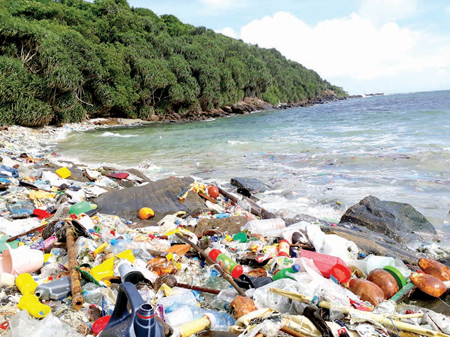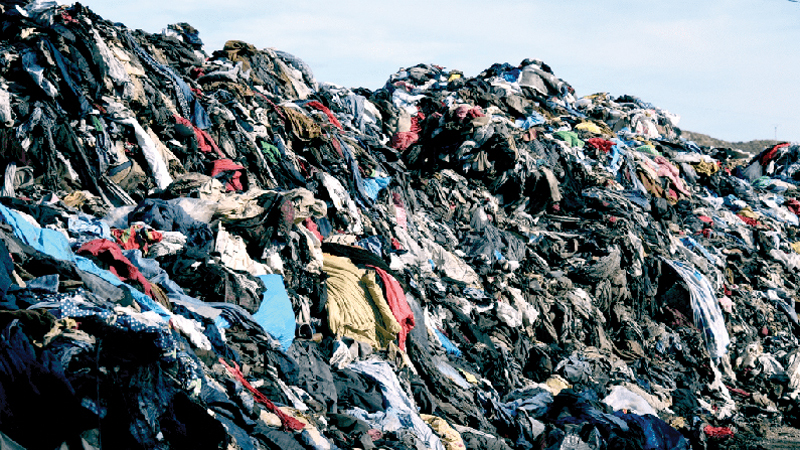 Recycling may be in vogue now, but most Sri Lankans have more or less grown up with the concept. School uniforms were made with wide seam allowances so that children could wear them for several years as they grew.
Recycling may be in vogue now, but most Sri Lankans have more or less grown up with the concept. School uniforms were made with wide seam allowances so that children could wear them for several years as they grew.
Younger children got hand-me-downs from their elder siblings. Clothes were stitched and patched up multiple times before being thrown out or donated to those in need. Worn-out clothes were often repurposed into patchwork, transforming into bags, cushion covers, and other creative items, or used as pankada (rags) for rough household chores.
These simple practices are examples of living by the age-old wisdom of “waste not, want not”, which means that the less we waste, the more we will have, and the less we will need later. While not all of these practices have entirely faded, they are fast disappearing, especially in urban households where fast-fashion and convenience take precedence.
Doubling the number of times a garment is worn would reduce greenhouse gas emissions by 44 percent, according to the United Nations (UN), a powerful illustration of why each individual’s fashion choices matter.
Proclaimed by the UN General Assembly in 2022, the International Day of Zero Waste is observed annually on March 30 (today) to raise awareness and celebrate zero-waste initiatives. This year’s theme, “Towards Zero Waste in Fashion and Textiles”, serves as a timely reminder to rethink the impact of textile waste, which is estimated to be as high as 92 million tonnes worldwide each year. This is equivalent to a truckload of clothing being incinerated or sent to landfills every second, highlighting the severe environmental, economic, and social challenges that come in tandem, especially in the Global South.
Hidden costs
“The True Cost”, a compelling 93-minute documentary film released in 2015, sheds light on the hidden costs of fast fashion. It examines how the fashion industry, once characterised by only two seasons, Spring/Summer and Fall/Winter, has transitioned to 52 micro-seasons or new collections weekly, pushing consumers to buy more than they need.

Marine pollution caused by waste
Referring to the 2013 Rana Plaza disaster in Bangladesh, where an eight-story garment factory, which remained unattended despite visible cracks in the walls, collapsed, killing over 1,100 workers, the documentary shows how this rapid cycle of new trends and products is riddled with exploitative labour practices. Spotlighting the environmental pollution caused by textile waste, dyes and chemicals, it encourages viewers to make more conscious and sustainable choices.
Sri Lanka’s thriving garment industry accounts for nearly half the export revenue, but it also generates tens of thousands of tonnes of textile waste every year. As the country lacks recycling facilities, much of this waste is burned for low-value energy, dumped openly, or exported.
Textile waste has potential to be converted into high-value products through recycling and upcycling. Some companies are exploring ways to turn fabric waste into new products, such as yarn or non-woven materials.
However, these efforts need broader adoption and Government support. With the European Union (EU) implementing stricter sustainability regulations, Sri Lankan apparel companies will have to prioritise transparency and traceability in their supply chains to meet international standards.
Move away from throwaway culture
Waste management, on the whole, is a lingering issue in Sri Lanka. On average, Sri Lanka produces 7,000 metric tonnes of solid waste daily, with the Western Province alone contributing nearly 60 percent of this. In this fast-paced world, Municipal solid waste has become nobody’s child. If packed into standard shipping containers and placed end-to-end, the Municipal solid waste generated in one year would wrap around the globe 25 times, according to the UN. Zooming out to the bigger picture, the UN points out that the increasing resource use is the main driver of the “Triple Planetary Crisis” of Climate Change, Biodiversity Loss, and Environmental Pollution.
The beast is large enough to cause havoc, but can still be tamed. Let us pause to rethink our consumer habits and make a genuine effort to move away from the throwaway culture. After all, “one man’s trash is another man’s treasure”. Embracing sustainability and circularity not only makes you an environmentally responsible citizen but is also easier on your wallet.
This is where we can take inspiration from our ancestors. They might not have called it the ‘Circular Economy’ or the ‘3R Concept’ as we do today, but they certainly knew how to Reduce, Reuse, Recycle or Upcycle materials to extend their lifecycle. It is this important lesson we seem to have conveniently forgotten, leading to the repercussions we face today.
Start with yourself
Always be a mindful consumer. Just as little drops of water make a mighty ocean, simple behavioural changes by individuals can collectively make a big difference. For example, how many polythene bags do you take home each time you visit a supermarket? Would it hurt to have a reusable grocery bag or two when you run errands?
Change starts with awareness. Awareness on how to reduce domestic food and other waste and the true cost behind impulsive buying habits fuelled by marketing manoeuvres would help more people move towards action.
While providing infrastructure facilities to the Local Government authorities for waste management, the Government should provide more incentives for both consumers and businesses to adopt sustainable practices. After all, it is the Government that has to foot the bill for Municipal solid waste management and be in the firing line when garbage collection goes haywire, as witnessed several times in recent memory.
Environmental authorities have been promoting the policy of Extended Producer Responsibility (EPR) in recent times, encouraging brands to manage the waste their products generate. Yet, there is no specific law in Sri Lanka that makes the top polluters bound by this “polluter pays” policy. Addressing such lacunae will be important in the country’s quest for a sustainable zero waste future.




